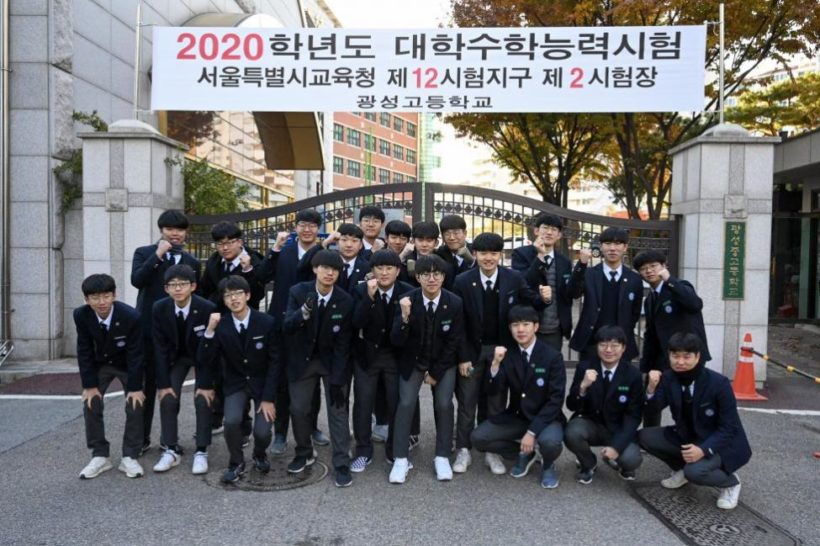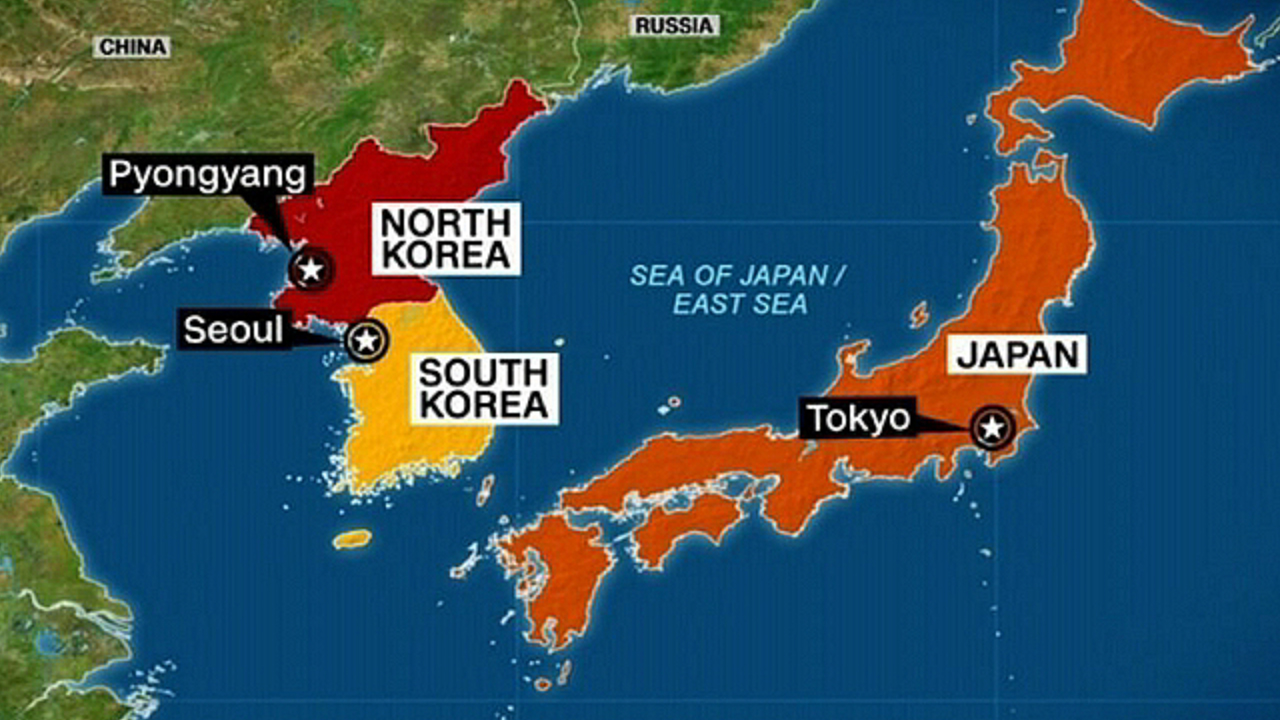
More than half a million students across South Korea took the College Scholastic Ability Test on Thursday, a once-a-year exam that many see as a make-or-break moment for their futures. Photo by Thomas Maresca/UPI
redo Jump to...
print Print...
(by Thomas Maresca, UPI) SEOUL– On Thursday morning (Nov. 14), all of South Korea seemed to be focused on one thing: the Collegiate Scholastic Aptitude Test (CSAT), the once-a-year, high-stakes college entrance exam that is seen by many as one of life’s most pivotal moments.
Offices across the country opened an hour late to keep traffic off the roads and extra trains and buses were put into service so the 550,000 students taking the exam this year could get to their testing locations on time.
Some parents accompanied their children to the test sites, giving them final hugs and handshakes before the big exam, while others made pilgrimages to churches and temples to pray for luck.
The test is so important that flights are even grounded for 35 minutes during the English-listening portion of the exam so as not to distract students.
The CSAT, also known as Suneung, is a grueling, eight-hour marathon standardized test covering a slew of topics, including Korean language, math, English, Korean history and social sciences.
Outside Kwangsung High School in Seoul, one of Thursday’s 1,185 testing locations in the country, groups of younger students clustered around the entrance on a bitterly cold morning to support the test takers.
They held signs reading “You’ll do great!” and chanted “Fighting!” a Korean term of encouragement, while passing out bags of snacks with goodies like yeot, a sticky, toffee-like confection that is a traditional good-luck snack for Suneung.
“We came out to cheer them on,” said 17-year-old Park Hye-sin, who will be taking the CSAT next year. “We know how stressful it is. I’ve already started studying for it.”
The test is a subject of intense focus throughout high school for most students in South Korea, as it remains perhaps the single most important factor in getting into a top university. …
While interviews, essays and grades are part of the admissions process, getting a top score on the CSAT is necessary to enter elite schools such as the so-called SKY universities — Seoul National University, Korea University and Yonsei University — which are seen as the stepping stones to the top echelons of government and corporate life.
South Korea places an enormous emphasis on education and it has the world’s highest level of college participation, with more than 70 percent of graduates moving on to tertiary education, according to the Organization for Economic Co-operation and Development.
Private tutoring has become a massive industry helping to fuel the educational obsession, with almost 73 percent of students taking some form of private lessons, according to a study from the Ministry of Education and Statistics Korea. …
While the CSAT is nerve-wracking, it has also long been seen as commendably meritocratic, offering a chance for rich and poor alike to compete on a level playing field. …..
[Due to several scandals involving government officials’ children being admitted unfairly to prestigious universities], South Korean President Moon Jae-in recently announced “drastic measures” for education reform to help level the playing field. …The reform measures include raising the proportion of “regular admissions” — those heavily based on grades and the CSAT score — rather than “non-scheduled admissions,” which weigh extracurricular activities and other factors in an opaque system that favors students from elite schools. …
Published at UPI .com on November 14. Reprinted here on November 19 for educational purposes only. May not be reproduced on other websites without permission from United Press International.
Questions
1. For SOUTH KOREA, give the following information:
- capital
- location/the countries that share its borders
- the religious breakdown of the population
- the type of government
- the chief of state (and head of government if different) If monarch or dictator, since what date has he/she ruled? – include name of heir apparent for monarch
- the population
Find the answers at the CIA World FactBook website. For each country, answers can be found under the “Geography” “People” and “Government” headings.
NOTE: Before answering the following questions, read the “Background” and watch the videos under “Resources” below.
2. For SOUTH KOREA:
a) list the who, what, where and when of the news item
b) How many students are taking the CSAT this year?
c) List the actions taken in South Korea to help students during the yearly CSAT (Suneung) exams. — For what reasons are these actions taken?
d) What do you learn about the CSAT from the article? — Why is it so important?
e) South Korea is a much smaller country than the U.S., in size and population. Should it be possible to do so here, would you want the government and businesses to take the same actions on the day the SATs are given? Explain your answer.
Background
More from the UPI article above:
“All through high school, you’re focused on this one exam,” said Jeon Eu-jin, 18, who took the test last year. “It’s all that matters. There’s only one test a year, and if you don’t get the score you want, you have to wait another year. One hundred percent of students feel stress about the exam.”
Jeon, who is studying robotics engineering at Dongyang Mirae University in Seoul, recalled the nerve-wracking experience.
“On the day of the test, when I opened my eyes and woke up, I could literally feel myself shaking,” he said. “I was planning to take the bus to the testing location, but I asked my dad to give me a ride instead because I felt so shaky. While I was taking the test, I kept feeling worse at the end of each section.”
Cho Eun-hye, a 19-year-old architecture student who took the CSAT last year, said she prepared by taking private lessons after school for a year leading up to the test and then continued studying at home or a café until late at night, with days starting at 6 a.m. and often ending at midnight or later.
Cho said that the anxiety intensifies as the date of the test gets nearer.
“One month before the test, students get so stressed out,” she said. “Everyone tries to follow the same pattern: wake up at the same time, eat the same foods, so there are no surprises on the test day.”
Resources
Watch a Nov. 13, 2019 report from Korea Now:
Watch a Nov. 13, 2019 report from Arirang News:
Daily “Answers” emails are provided for Daily News Articles, Tuesday’s World Events and Friday’s News Quiz.




